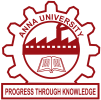MA7153 ADVANCED MATHEMATICS FOR COMPUTING L T P C 4 0 0 4
OBJECTIVES:
To understand the basics of random variables and standard distributions
To understand the arrival process and various queueing and server models
To appreciate the use of simulation techniques
To apply testing of hypothesis to infer outcome of experiments
To apply mathematical linear programming techniques to solve constrained problems.
UNIT I RANDOM VARIABLES 12
Random variables – Bernoulli, Binomial, Geometric, Poisson, Uniform, Exponential, Erlang and Normal distributions – Function of a Random variable – Moments, Moment generating function.
UNIT II QUEUING MODELS 12
Poisson Process – Markovian Queues – Single and Multi-server Models – Little‟s formula – Machine Interference Model – Steady State analysis – Self Service Queue.
UNIT III SIMULATION 12
Discrete Event Simulation – Monte – Carlo Simulation – Stochastic Simulation – Applications to Queuing systems.
UNIT IV TESTING OF HYPOTHESIS 12
Sampling distributions – Estimation of parameters – Statistical hypothesis – Tests based on Normal, t, Chi-square and F distributions for mean, variance and proportion.
UNIT V LINEAR PROGRAMMING 12
Formulation – Graphical solution – Simplex method – Two phase method -Transportation and Assignment Problems.
TOTAL: 60 PERIODS
OUTCOMES:
Upon completion of the course, the student will be able to
Identify the type of random variable and distribution for a given operational
conditions/scene
Design appropriate queuing model for a given problem/system situation
Simulate appropriate application/distribution problems
Differentiate/infer the merit of sampling tests.
Formulate and find optimal solution in the real life optimizing/allocation/assignment problems involving conditions and resource constraints.
REFERENCES:
1. Johnson, R.A. Miller and Freund‟s,” Probability and Statistical for Engineers, Prentice Hall of India Pvt., Ltd., New Delhi, Seventh Edition, 2005.
2. Hamdy A. Taha, “Operations Research: An Introduction”, Prentice Hall of India Pvt., Ltd. New Delhi, Eighth Edition, 2007.
3. Jay L. Devore,” Probability and Statistics for Engineering and the Sciences”, Cengage Learning, Seventh Edition, 2009.
4. Ross. S.M., “Probability Models for Computer Science”, Academic Press, 2002.
5. Winston, W.L., “Operations Research”, Thomson – Brooks/Cole, Fourth Edition, 2003. 6. Gross D. and Harris C.M., “Fundamentals of Queuing Theory”, John Wiley and Sons, New York, 1998. 7. J.Medhi,” Stochastic models of Queuing Theory”, Academic Press, Elsevier, Amsterdam, 2003
